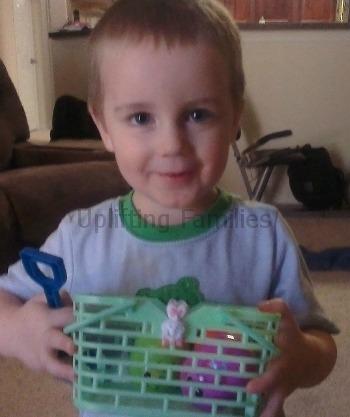 According to the American Board of Pediatrics, playing helps build your child’s cognitive, physical, social, and emotional well being. Playing is important and children and parents should take time out of their day to sit down to play with your child. It is a great way to spend quality time with your child and create memories. Many children today aren’t given the opportunity to play freely and learn how to play own their own using their own imagination, creativity, thinking skills, and cognitive skills.
According to the American Board of Pediatrics, playing helps build your child’s cognitive, physical, social, and emotional well being. Playing is important and children and parents should take time out of their day to sit down to play with your child. It is a great way to spend quality time with your child and create memories. Many children today aren’t given the opportunity to play freely and learn how to play own their own using their own imagination, creativity, thinking skills, and cognitive skills.
Disclosure: This post may contain affiliate links.
After my son played with my nieces, he started using his imagination, creativity, and has started pretending while playing. Most children love learning through play and often times they will also try to imitate things that we do on a daily basis.
Benefits of Pretend Play
Have you ever heard your toddler playing house, picking up a car and making motor sounds, hop like a bunny across the living room, cook “food” using toys, or things around the house, or pretending? As they are playing, they are doing so much more than just having fun. They are building other skills that are important for their development.
- Social Skills – As they are playing, your child often will take on the role of pretending to be different characters or people while playing with their toys. They may even imitate other people’s voices. For example, if your child is playing house with their friends or other siblings, your child might pretend they are the mommy or daddy and will say things that their parents might say to them. Also, kids quickly figure out that they can be anything or anyone they want to be when they are pretend playing.
- Emotional Skills – If your child is pretending, it is possible that they will take on the emotions of others during play time. My youngest son often will tell me that he doesn’t feel good because I tell him that mommy doesn’t feel good or can’t pick him up. Pretend play helps them learn how to cope with different emotions (ie love, empathy, happy, sad, ect) and it helps them to develop their own emotional maturity.
- Language Skills – While playing with their action figures, stuffed animals, or other toys, your child might pretend to have conversations between the different the different characters. Don’t be surprised if you hear things that you have said, they are parrots and will repeat nearly anything that they hear. Also, your child might even surprise you and start saying things that you didn’t even know that they know how to say.
- Builds Thinking Skills – As your child is busy pretending and playing, they are learning how to solve problems. For example, if they want to build a fort they have to figure out what materials they need in order to build their fort. They skills that they are learning through play will be used the rest of their lives.
- Freedom – Pretend play allows your child to play independently and have some sort of control over what they want to do. Of course, you should still supervise your child or check in on them to make sure that they aren’t doing things that could hurt them like climbing the walls ect. Young children are constantly being told “no” or “you can’t do that” and free play gives them to opportunity to pick out some of their toys and play by themselves or with others.
- Independence – Store your child’s pretend toys in a place that is easily accessible and in a place that they can find them. You can encourage your child to choose what they want to play with while you are cooking dinner or trying to get a few things done around the house.

